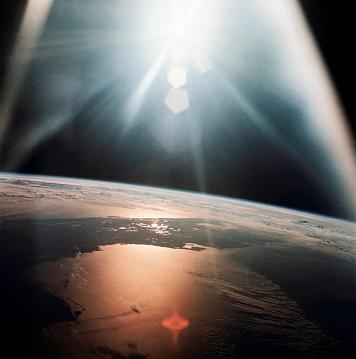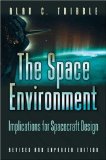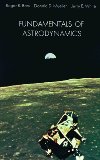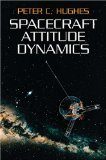Les Johnson is the Deputy Manager for the Advanced Concepts Office at the George C. Marshall Space Flight Center in Huntsville, Alabama.
He recently took the time to answer a few questions for OrbitalHub readers.
Please note: Les Johnson wrote Paradise Regained as a private citizen and the views expressed herein are his own and unofficial.
DJ: You have an engineering background, hold patents, and have contributed to numerous technical publications. Traditionally, in light of the Victorian view of the engineer, who is the superhero taming nature, environmental issues and the impact of human civilization on the environment are not always areas of concern for people with an engineering background. How did you develop your interest in these areas?
Les Johnson: Before I earned my MS in physics, I earned a BA from a liberal arts college (Transylvania University in Lexington, KY). I am a firm believer in a well rounded education — college should provide an education, not just a vocation.
When I first became interested in space exploration, it was all about “going there” or “leaving here.” As I’ve experienced more of life (marriage, children, travel and working with many interesting people from all around the world) my views changed. The world changed. Billions of previously “invisible” people from all around the world are wanting to improve their quality of life and there simply are not enough resources here to sustain six billion people consuming even half as much as the average American. And we don’t have the right to say “we can have a good life but you can’t!” That would be immoral. It would also be immoral to degrade the quality of life of those in the developed world. My worldview doesn’t allow me to think that the quality of human life, all human lives, cannot be improved. My worldview, combined with recent technological advances (in many areas discussed in Paradise Regained), led me to the conclusion that it is more important for humanity to develop space for the benefit of the multitudes here on Earth rather than for the few who will leave the planet to explore the solar system and beyond.
DJ: In his book The High Frontier, Professor Gerard K. O’Neill of Princeton described space colonies located at the Lagrangian points in the Sun-Earth system. He also envisioned solar power stations, mining operations on the moon, and a roadmap for the human settlement of the Solar System. To what extent was the work of Gerard K. O’Neill an inspiration to you?
L.J.: O’Neill was a visionary. He, Von Braun, Clarke and others provided the vision for those of us who came later. I don’t consider myself to be a visionary but rather an implementer. I’ve spent my career at NASA advocating for the development of advanced technologies and their use in space missions. Most of those technologies were actually invented by others — my talent is making things happen.
DJ: Clearly solar power is an alternative to our current power energy sources and a solution for the future. Space solar power is not a new idea, but the technology had to catch up with the concept. Given the costs and the fact that governments lack the necessary funds due to financial difficulties, do you think such developments are still feasible?
L.J.: Can we afford NOT to develop space solar power? As I write, a leak from a single oil well in the Gulf of Mexico is going to cause economic and environmental damage estimated to be in excess of $9B and Iran is enriching uranium from its nuclear power reactors to make bombs. We could develop space solar power for far less than we are spending to maintain access to middle eastern oil, not to mention the money we are sending to countries who then use that money to fund terrorists. To put things into perspective, the United States budget this year totals $3.5 trillion dollars — that’s $3500 billion dollars. The NASA budget is $18 billion dollars. The budget for the Department of Energy is $26 billion. What about the other $3456 billion? We can afford to do the research. It just isn’t considered important enough by those that make budget decisions.
And there is no reason that the cost should be borne by taxpayers alone. Yes, government should probably foster the technologies required to make space solar power possible. Industry should then make the up-front investment to place the satellites in orbit. After all, they will make money for a long time after the satellites are in place and beaming clean power back down to the people of Earth.
DJ: The new NASA policies seem to put lunar exploration on hold and focus on more distant objectives like Mars or the asteroid belt. Why do you think the solar-powered mining facilities extracting the Helium-3 trapped in the lunar regolith have lost their appeal?
L.J.: Mining the Moon has never been an official NASA objective. Project Constellation, NASA’s name for the now-canceled plan to return astronauts to the Moon, was all about getting there for science and exploration. There was nothing in the plan that would have lead to using lunar resources like helium-3.
I believe the appeal is still strong among the public. When I speak about Paradise Regained, I discuss lunar mining — and how I’d rather mine the Moon for energy instead of the mountains of Kentucky or West Virginia. People understand this and they support it. They just don’t understand why we aren’t working to make it happen.
DJ: In the same context, do you think such a change of direction can be more beneficial for the long-term human exploration of our solar system?
L.J.: That depends. Today, people ask why we explore space and how space exploration has benefitted them personally. The answer to that question will be self-evident when we are getting clean energy from space, an improving quality of life, and a recovering environment resulting from the use of space resources. And with the development of space for the betterment of Earth will come lower launch costs and more frequent access to space — the necessary ingredients for a robust exploration of the solar system and beyond.
DJ: The new strategy for exploration of the Earth orbit and beyond relies heavily on private companies. Private companies are driven by profit and many of the environmental issues that we have to face in the present are a direct consequence of this fact. How do you think we can avoid a replay of this tragedy when we eventually move some of the industries from the surface of the Earth into space?
L.J.: There is a role for both government and private enterprise in space exploration. Government should fund basic and applied research to advance the technologies needed. Industry should use that technology to explore and then provide goods and services for consumers back home on Earth for a profit. Profit can be a good thing — if it is the result of innovation and effort.
One should note that the worst environmental offenses of the last one hundred years occurred in countries without private enterprise. The Soviet Union and its satellite countries were far less environmentally friendly than their free-world counterparts. Government control and socialism will not necessarily lead to a greener world.
Finally, the space environment is very different from the environment here on Earth. As far as we know, only the Earth has life. The environment that supports life is important and should be protected. If I have a choice between mining the Moon to provide fuel for clean and safe power on Earth versus mining the mountains of West Virginia, then the choice will be clear — mine where we are not harming any life whatsoever. We should preserve and protect this island of blue and green in an otherwise hostile and deadly universe — Earth.
Les Johnson is one of the authors of Paradise Regained – The Re-greening of Earth, a book which describes a scenario for the re-greening of planet Earth. The book explores the ways in which modern human civilization can use the resources of the solar system to benefit the Earth. The authors suggest that one way to minimize the impact we have as a species on the Earth’s ecosystem is to use extraterrestrial energy sources and move polluting industries from the Earth’s surface to space. A review of the book was published by Paul Gilster on Centauri Dreams.











 Subscribe to our RSS feed
Subscribe to our RSS feed











There are no comments.
Add A Comment